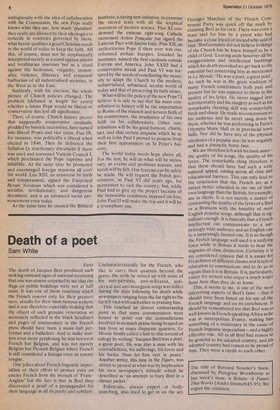Death of a poet
Sam White
Paris The death of Jacques Brel produced such striking outward signs of national mourning that one was almost surprised to see that the flags on public buildings were not at half mast. It was one of those reactions which the French reserve only for their greatest men, usually for their most famous writers, and it was therefore especially striking that the object of such genuine veneration so accurately reflected in the black headlines and pages of commentary in the French press should have been a music-hall performer and a balladeer. And to make matters even more perplexing he was not even French but Belgian, and was not merely Belgian but Flemish Belgian where French is still considered a foreign even an enemy tongue.
One jokes about French linguistic imperialism or their effort to protect even an enemy French from the inroads of 'FrancAnglais' but the fact is that in Brel they discovered a pearl of a propagandist for their language in all its purity and subtlety. Uncharacteristically for the French, who like to carry their quarrels beyond the grave, the strife he stirred up with some of his anti-patriotic, anti-militarist, anticlerical and anti-bourgeois songs was stilled during the days following his death while newspapers ranging from the far right to the far left vied with each other in praising him.
This reached an almost embarrassing point so that some commentators were bound to point out the contradictions involved in so much praise being heaped on him from so many disparate quarters. Le Monde finally called a halt to this torrent of eulogy by writing: 'Jacques Brel was a poet, a great poet. He was also a man with his contradictions, his sufferings, his loves and his furies. Now let him rest in peace.' Another writer, this time in the Figaro, was driven to protest at what was by implication his own newspaper's attitude which he described as 'an attempt to bury Brel in a dinner jacket.'
Politicians, always expert at bodysnatching, also tried to get in on the act. Georges Marchais of the French Communist Party was quick off the mark by claiming Brel as his own. There was even a mass said for him by a priest who had become a close friend of his and who said of him: 'Brel certainly did not believe in things of the Church but he knew himself to be a child of God.' Leaving aside however all the exaggerations and intellectual burblings which his death provoked we get back to the essential fact concerning him as mentioned in Le Monde: 'He was a poet, a great poet'. As such he was in the great tradition of many French entertainers both past and present but he was superior to them in the quality of his lyrics. He never sagged into sentimentality and his imageryas well as his remarkable rhyming skill was wonderfully fresh and sharp. He made no concessions to his audience and he never sang down to them, whether he was performing in Paris's Olympia Music Hall or in provincial town halls. Nor did he have any of the physical attributes of a popular star: he was ungainly and had a distinctly horsy face.
We are therefore left with his basic asset— the quality of his songs, the quality of his lyrics. The remarkable thing therefore is that these should have had such a wide national appeal, cutting across all class and educational barriers. This can only lead to the conclusion that the French are as a nation better educated in the use of their own language than the British, for example, are in theirs. It is not merely a matter of contrasting the quality of the lyrics of a Brel or a Brassens with the banality of most English popular songs, although that is significant enough. It is basically that a French intellectual. can communicate to a surprisingly wide audience and an English one to a surprisingly limited one. It is as though the French language well used is a unifying force while in Britain it tends to bear the stigmata of class distinction. Certainly it is my considered opinion that it is easier for Frenchmen of different classes and levels of education to communicate and to do so as equals than it is in Britain. It is, particularly, easier for writers who enjoy a much wider fame here than they do at home.
This, it seems to me, is one of the most interesting aspects of Brel's fame — that it should have been based on his use of the French language and on its enrichment. It should be remembered too that Brel was as well known in French-speaking Africa as he was in metropolitan France, making him something of a missionary in the cause of French linguistic imperialism — and a highly effective one. All in all Brel had reason to be grateful to his adopted country, and his adopted country had reason to be proud of him. They were a credit to each other.






































 Previous page
Previous page